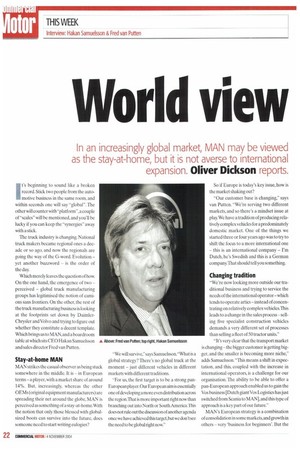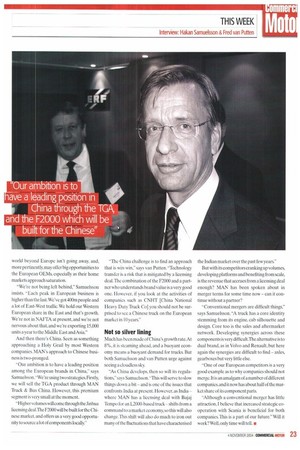ittior I d view
Page 22

Page 23

Page 24

If you've noticed an error in this article please click here to report it so we can fix it.
In an increasingly global market, MAN may be viewed as the stay-at-home, but it is not averse to international
expansion. Oliver Dickson reports.
Il's beginning to sound like a broken record. Stick two people from the automotive business in the same room, and within seconds one will say "global". The other will counter with "pl atform",a couple of "scales" will be mentioned, and you'll be lucky if you can keep the "synergies" away with a stick.
The truck industry is changing. National truck makers became regional ones a decade or so ago, and now the regionals are going the way of the 0-word, Evolution — yet another buzzword — is the order of the day.
Which merely leaves the question of how. On the one hand, the emergence of two — perceived — global truck manufacturing groups has legitimised the notion of camions sans frontiers. On the other, the rest of the truck manufacturing business is looking at the footprints set down by DaimlerChrysler and Volvo and trying to figure out whether they constitute a decent template. Which brings us to MAN, and a boardroom table at which sits CEO Hakan Samuelsson and sales director Fred van Putten.
Stay-at-home MAN
MAN strikes the casual observer as being stuck somewhere in the middle. It is — in European terms — a player, with a market share of around 14%. But, increasingly, whereas the other OEMs (original equipment manufacturers) are spreading their net around the globe. MAN is perceived as something of a stay-at-home.With the notion that only those blessed with globalsized boots can survive into the future, does someone need to start writing eulogies? "We will survive," says Samuelsson."What is a global strategy? There's no global truck at the moment — just different vehicles in different markets with different traditions.
"For us, the first target is to be a strong panEuropean player. Our European aim is essentially one of developing a more even distribution across the region.That is more important right now than branching out into North or South Ameticalhis does not rule out the discussion of another agenda once we have achieved this target,but we don't see the need to be global right now." So if Europe is today's key issue, how is the market shaking out?
"Our customer base is changing," says van Pullen. "We're serving two different markets, and so there's a mindset issue at play.We have a tradition of producing relatively complex vehicles for a predominately domestic market. One of the things we started three or four years ago was to try to shift the focus to a more international one — this is an international company — I'm Dutch, he's Swedish and this is a German company.That should tell you something.
Changing tradition
"We're now looking more outside our traditional business and trying to service the needs of the international operator—which tends to operate attics — instead of concentrating on relatively complex vehicles. This leads to a change in the sales process— selling five specialist construction vehicles demands a very different set of processes than selling a fleet of 50 tractor units."
"It's very clear that the transport market is changing— the bigger customer is getting bigger, and the smaller is becoming more niche," adds Samuelsson. "This means a shift in expectation, and this, coupled with the increase in international operators, is a challenge for our organisation. The ability to be able to offer a pan-European approach enabled us to gain the Vos business [Dutch giant Vos Logistics has just switched from Scania to MANI, and this type of approach is a key part of our future."
MAN's European strategy is a combination of consolidation in some markets, and growth in others — very 'business for beginners'. But the world beyond Europe isn't going away. and, more pertine ntly, may offer big opportunities to the European OEMs, especially as their home markets approach saturation.
-We're not being left behind," Samuelsson insists. "Each peak in European business is higher than the last. We've got 400m people and a lot of East-West traffic. We hold our Western European share in the East and that's growth. We're not in NAFTA at present, and we're not nervous about that, and we're exporting 15,000 units a year to the Middle East and Asia."
And then there's China. Seen as something approaching a Holy Grail by most Western companies. MAN's approach to Chinese business is two-pronged.
-Our ambition is to have a leading position among the European brands in China," says Samuelsson.'`We're using two strategies.Firstly, we will sell the TGA product through MAN Truck & Bus China. However, this premium segment is very small at the moment.
"Higher volumes will come through the Jinhua licensing deal .The F2000 will be built for the Chinese market, and offers us a very good opportunity to source a lot of components locally." "The China challenge is to find an approach that is win-win," says van Putter). -Technology transfer is a risk that is mitigated by a licensing deal. The combination of the F2000 and a partner who understands brand value is a very good one. However, if you look at the activities of companies such as CNHT [China National Heavy Duty Truck Col you should not be surprised to see a Chinese truck on the European market in 10 years."
Not so silver lining Much has been made of China's growth rate.At 8%, it is steaming ahead, and a buoyant economy means a buoyant demand for trucks. But both Sam uelsson and van Putten urge against seeing a cloudless sky.
"As China develops, then so will its regulations," says Samuelsson. "This will serve to slow things down a bit and is one of the issues that confronts India at present. However, as Indiawhere MAN has a licensing deal with Bajaj Tempo for an L2000-based truck shifts from a command to a market economy, so this will also change. This shift will also do much to iron out many of the fluctuations that have characterised the Indian market over the past few years."
But with its competitors cranking up volumes, developing platforms and benefiting from scale, is the revenue that accrues from a licensing deal enough? MAN has been spoken about in merger terms for some time now can it continue without a partner?
"Conventional mergers are difficult things," says Samuelsson. "A truck has a core identity stemming from its engine, cab silhouette and design. Core too is the sales and aftermarket network. Developing synergies across these components is very difficult.The alternative is to dual brand, as in Volvo and Renault, but here again the synergies are difficult to find axles, gearboxes but very little else.
"One of our European competitors is a very good example as to why companies should not merge. It is an amalgam of a number of different companies, and it now has about half of the market share of its component parts.
"Although a conventional merger has little attraction, I believe that increased strategic cooperation with Scania is beneficial for both companies. This is a part of our future." Will it work? Well, only time will tell. •
Let's stand together
Why are we accepting, without any representation, the incredible price of fuel at the moment? Which other industries would accept having to work on such small margins month after month?
Our necessary acceptance of the reasons for crude oil rises does not alter the fact that the Treasury has now collected billions more than it budgeted for. For every price rise, the Treasury receives its revenue not only from the raw material of the North Sea but also an amazing 80% of the price rise of the finished product, no matter where it is produced.
It is time for industry and the general public to be shown just how much they need us. I am not advocating any illegal action; all we have to do is stay at base on Monday morning. Can you afford it? Well, probably not, but neither can you afford to operate on such pathetic cashflow for much longer.
The biggest problem I foresee is, can we trust each other? On past evidence that's a resounding no.
Stand together. Do not steal each other's work,do not cut rates in an economic climate such as we have, and maybe we can get our industry back.
Stuart Bowman Bowmans Haulage By e-mail






























































































































































































